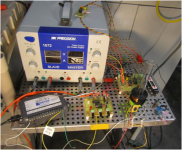Genetically Modified Bacteria for Fuel Production

Technology Description:
Pennsylvania State University (Penn State) is genetically engineering bacteria called Rhodobacter to use electricity or electrically generated hydrogen to convert carbon dioxide into liquid fuels. In collaboration with the University of Kentucky, Penn State is taking genes from oil-producing algae called Botryococcus braunii and putting them into Rhodobacter to produce hydrocarbon molecules, which closely resemble gasoline. Penn State is developing engineered tanks to support microbial fuel production and determining the most economical way to feed the electricity or hydrogen to the bacteria, including using renewable sources of power like solar energy.
Potential Impact:
If successful, the Penn State team would create a liquid transportation fuel that is cost competitive with traditional gasoline-based fuels and 10 times more efficient than existing biofuels.
Security:
Cost-competitive electrofuels would help reduce U.S. dependence on imported oil and increase the nation's energy security.
Environment:
Widespread use of electrofuels would help limit greenhouse gas emissions and reduce demands for land, water, and fertilizer traditionally required to produce biofuels.
Economy:
A domestic electrofuels industry could contribute tens of billions of dollars to the nation's economy. Widespread use of electrofuels could also help stabilize gasoline prices—saving drivers money at the pump.
Contact
ARPA-E Program Director:
Dr. Ramon Gonzalez
Project Contact:
Dr. Wayne Curtis
Press and General Inquiries Email:
ARPA-E-Comms@hq.doe.gov
Project Contact Email:
wrc2@psu.edu
Partners
University of Kentucky
Related Projects
Release Date:
02/07/2009
